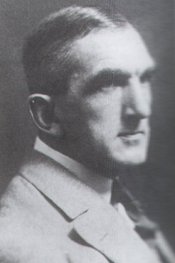Edward Fegen facts for kids
Quick facts for kids
Edward Fegen
|
|
|---|---|

Edward Fegen
|
|
| Born | 8 October 1891 Southsea, Hampshire, England |
| Died | 5 November 1940 (aged 49) HMS Jervis Bay, Atlantic Ocean |
| Allegiance | United Kingdom |
| Service/ |
Royal Navy |
| Years of service | 1904–1940 |
| Rank | Captain |
| Commands held | HMS Jervis Bay (1940) HMS Curlew (1939) HMS Dragon (1938) HMS Dauntless (1935) HMS Osprey (1932–34) HMS Forres (1926–27) HMS Volunteer (1924) HMS Somme (1922–24) |
| Battles/wars | First World War Second World War
|
| Awards | Victoria Cross Sea Gallantry Medal (Silver) |
Edward Stephen Fogarty Fegen (born October 8, 1891 – died November 5, 1940) was a brave officer in the Royal Navy. He received the Victoria Cross, which is the highest award for courage in battle for British and Commonwealth forces.
Edward Fegen grew up in a family connected to the navy. His father was Vice-Admiral F. F. Fegen. Edward was born in Southsea, England, on October 8, 1891. When he was 12, he joined the Osborne Royal Naval College. In 1909, he became a Midshipman on the battleship HMS Dreadnought.
Contents
Heroic Actions in World War I
During the First World War, on March 24, 1918, a British ship called SS War Knight crashed into an American oil ship named O.B. Jennings. The oil on the American ship caught fire. Soon, both ships and the water around them were burning.
The crew of O.B. Jennings tried to escape in lifeboats. Some boats burned, but others were launched. Lieutenant Fegen was in command of HMS Garland. His ship, along with others, rushed to help. They saw one lifeboat from O.B. Jennings had sunk.
Saving Lives at Sea
HMS Garland quickly went to the sinking lifeboat and rescued the men. Then, even though the O.B. Jennings was still on fire, Fegen brought his ship right next to it. They rescued the people who were still on board. Afterward, they picked up others who had left the ship in boats.
In total, Lieutenant Fegen and his crew saved four officers and twenty-two men. Fegen showed great skill in handling his ship during this dangerous rescue. For their bravery, both Fegen and Quartermaster Driscoll received Silver Sea Gallantry Medals.
Service Between the Wars
Later in his naval career, Captain Fegen worked with the Royal Australian Navy. From 1928 to 1929, he was an executive officer at the Royal Australian Naval College. This college was located on Jervis Bay in Australia. It was a coincidence that the ship he later commanded, and where he became famous, was also named Jervis Bay.
Bravery in World War II
In the Second World War, Captain Fegen was 49 years old. On November 5, 1940, he was commanding an armed merchant ship called HMS Jervis Bay. His ship was protecting 38 other merchant ships in a group called Convoy HX 84 in the Atlantic Ocean.
Facing a Powerful Enemy
Suddenly, a powerful German warship, the Admiral Scheer, attacked the convoy. This German ship was much stronger than the Jervis Bay. Captain Fegen knew he had to protect the other ships. He immediately steered Jervis Bay directly towards the German warship.
This brave action gave the other ships in the convoy time to scatter and escape. Even though Jervis Bay was out-gunned and quickly caught fire, Captain Fegen kept fighting for 22 minutes. He was badly wounded, but he continued to command until the ship's bridge was destroyed.
A Hero's Sacrifice
Captain Fegen went down with his ship. But because of his incredible courage and sacrifice, 31 of the 38 merchant ships in the convoy managed to escape. This included the San Demetrio.
His bravery was recognized by Winston Churchill, the British Prime Minister, in a speech on May 13, 1945. Churchill spoke of Captain Fegen as one of the "Irish heroes" who showed great courage.
Captain Fegen was awarded the Victoria Cross for his actions. The official announcement, published on November 22, 1940, said:
The KING has been graciously pleased to approve the award of the VICTORIA CROSS to the late Commander (acting Captain) Edward Stephen Fogarty Fegen, Royal Navy for valour in challenging hopeless odds and giving his life to save the many ships it was his duty to protect.
On the 5th of November, 1940, in heavy seas, Captain Fegen, in His Majesty's Armed Merchant Cruiser Jervis Bay, was escorting thirty-eight Merchantmen. Sighting a powerful German warship he at once drew clear of the Convoy, made straight for the Enemy, and brought his ship between the Raider and her prey, so that they might scatter and escape. Crippled, in flames, unable to reply, for nearly an hour the Jervis Bay held the German's fire. So she went down, but of the Merchantmen all but four or five were saved.

